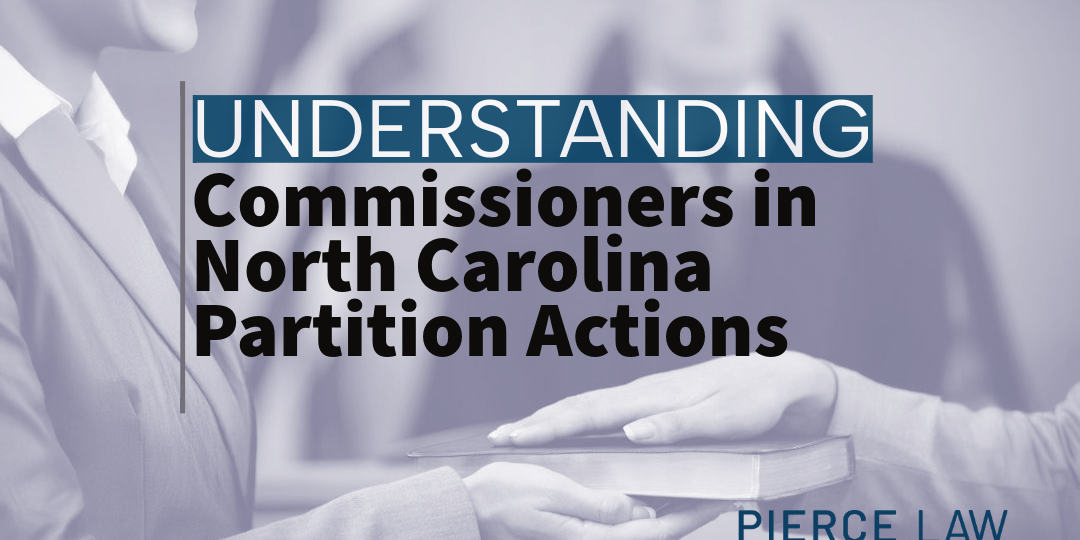Commissioners in North Carolina Partition Actions: What You Need to Know
Partition actions in North Carolina often require the appointment of commissioners to ensure the fair division or sale of real property. These commissioners play a critical role in upholding impartiality and ensuring the process adheres to legal standards. If you are involved in a partition action, understanding how commissioners are selected, their duties, and what to expect can make the process smoother. Here’s an in-depth guide to help you navigate these proceedings.
Who Are Commissioners in Partition Actions?
In a partition action, the Clerk of Superior Court appoints commissioners to oversee the division of real property among co-owners or to manage its sale. Importantly, these individuals must be disinterested, meaning they cannot have any stake in the property or parties involved. This ensures fairness and transparency throughout the process.
Key Characteristics of Commissioners
To perform their duties effectively, commissioners must meet several key requirements:
- Disinterest: Commissioners must not have any connection to the parties or property involved.
- Reliability: They should be credible and capable of serving as witnesses if the court requires their testimony.
- Competence: Commissioners must be able to understand the clerk’s instructions and carry out their responsibilities accurately.
These qualities ensure that the commissioners approach their role objectively and with the necessary expertise.
How Are Commissioners Appointed?
The Clerk of Superior Court oversees the appointment process, which includes several steps to maintain impartiality and fairness.
First, the clerk may allow the involved parties to suggest individuals for the commissioner roles. Typically, each party can propose one commissioner, and the clerk then selects a third to ensure balance. This process gives both sides an opportunity to contribute to the selection while still maintaining neutrality.
Next, before commissioners can begin their work, they must take an oath administered by the clerk. This oath ensures they commit to acting impartially and fulfilling their duties to the best of their abilities.
Finally, the clerk provides clear instructions to guide the commissioners as they perform their tasks. These instructions outline their responsibilities and help prevent misunderstandings or errors during the process.
Compensation for Commissioners
The Clerk of Superior Court also determines how much commissioners are paid. This compensation, which is considered part of the proceeding’s costs, is typically funded by the petitioner (the person who initiated the partition action). To ensure payment, the clerk may request a cash deposit from the petitioner before appointing the commissioners.
What Do Commissioners Do?
Once appointed, commissioners take on several responsibilities to ensure a fair and legally compliant outcome.
Divide the Land
One of the commissioners’ main tasks is to divide the property among co-owners in a way that is as equitable as possible. However, if dividing the property physically is impractical or unfair, the commissioners may recommend selling it and distributing the proceeds.
Prepare a Detailed Report
After completing their work, the commissioners must submit a detailed report to the Clerk of Superior Court. This report serves as a critical document and should include:
- A clear explanation of how the property was divided.
- Information about any owelty charges (payments made to balance inequalities in the division).
- A summary of how they carried out their responsibilities.
Notify All Interested Parties
Once the commissioners file their report, the clerk ensures that all interested parties receive a copy. This step gives the parties an opportunity to review the findings and raise any objections if necessary.
What Happens After Commissioners Submit Their Report?
Once commissioners complete their report and submit it to the Clerk of Superior Court, the process moves to the next phase. Here’s what typically happens:
1.Clerk Reviews the Report
The clerk carefully examines the report to ensure the commissioners followed the instructions and complied with legal requirements.
2.Parties Are Notified
The clerk sends the report to all involved parties. This gives them a chance to review the results and raise any objections.
3.Final Decision by the Clerk
After considering any objections or evidence presented by the parties, the clerk either approves the report as is or makes modifications.
These steps ensure that the partition process is both thorough and fair.
Why Are Commissioners Important?
Commissioners play a vital role in partition actions by bringing impartiality and structure to the process. Their work helps minimize conflicts among co-owners and ensures that the division or sale of property is handled appropriately. Without commissioners, the process could become mired in disputes or unfair practices.
When Should You Consult a Lawyer?
While commissioners are responsible for executing their duties impartially, the partition process can still be legally and emotionally complex. A North Carolina probate or real estate lawyer can help you:
- Understand your rights and responsibilities in a partition action.
- Navigate the legal requirements and procedures.
- Recommend qualified individuals for commissioner roles.
- Raise valid objections to the appointment or actions of commissioners if necessary.
Seeking legal advice early in the process can save time, reduce stress, and ensure a fair outcome.
Frequently Asked Questions About Commissioners
1. Can I reject a commissioner if I believe they are biased? Yes, you can raise an objection if you believe a commissioner has a conflict of interest. The Clerk of Superior Court will review your concerns and decide whether to appoint someone else.
2. Can I contest the commissioners’ report? Yes, you can object to the report if you believe the commissioners acted unfairly or failed to follow the clerk’s instructions.
Understanding the role of commissioners in North Carolina partition actions is essential for anyone navigating these proceedings. Commissioners ensure that property divisions or sales are conducted fairly and in compliance with the law. By familiarizing yourself with their responsibilities and the process, you can better protect your interests.
If you’re involved in a partition action or related legal matter, consulting an experienced probate or real estate lawyer can provide the guidance you need. Contact us today to schedule a consultation and learn how we can assist you.


